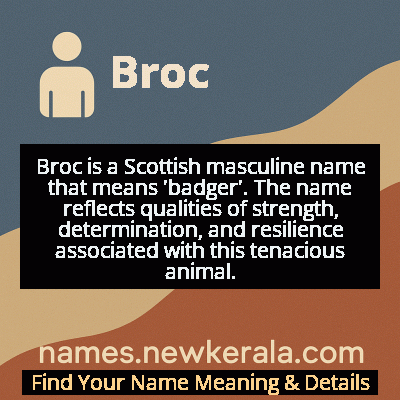Broc Name Meaning & Details
Origin, Popularity, Numerology Analysis & Name Meaning of Broc
Discover the origin, meaning, and cultural significance of the name BROC. Delve into its historical roots and explore the lasting impact it has had on communities and traditions.
Name
Broc
Gender
Male
Origin
Scottish
Lucky Number
2
Meaning of the Name - Broc
Broc is a Scottish masculine name that means 'badger'. The name reflects qualities of strength, determination, and resilience associated with this tenacious animal.
Broc - Complete Numerology Analysis
Your Numerology Number
Based on Pythagorean Numerology System
Ruling Planet
Moon
Positive Nature
Diplomatic, friendly, artistic, empathetic.
Negative Traits
Over-sensitive, moody, indecisive, prone to self-pity.
Lucky Colours
Green, cream, white.
Lucky Days
Monday.
Lucky Stones
Pearl, moonstone.
Harmony Numbers
1, 3, 4.
Best Suited Professions
Diplomats, mediators, caregivers, artists.
What People Like About You
Cooperative spirit, friendliness, artistic talent.
Famous People Named Broc
Broc Hepler
Professional Motocross Racer
AMA Motocross Champion known for his aggressive riding style and determination
Broc Everett
Professional Golfer
NCAA individual champion and professional golfer on various tours
Broc Feeney
Racing Driver
Australian Supercars Championship driver and rising motorsport star
Name Variations & International Equivalents
Click on blue names to explore their detailed meanings. Gray names with will be available soon.
Cultural & Historical Significance
In medieval Scotland, animal-based names like Broc served as important identifiers within clans and communities. The name would have been passed down through generations, carrying with it the accumulated reputation and characteristics associated with the original bearer. As Scottish culture evolved and surnames became more formalized, Broc transitioned from primarily a given name to also serving as a surname in some regions. The name's persistence through centuries demonstrates its enduring appeal and the continued respect for the qualities it represents in Scottish cultural identity.
Extended Personality Analysis
Individuals named Broc are typically associated with traits of determination, resilience, and quiet strength. Like their namesake animal, they often display remarkable persistence when pursuing goals and can be surprisingly formidable when challenged. They tend to be methodical thinkers who prefer careful planning over impulsive action, and they often excel in situations requiring patience and strategic thinking. Brocs are usually loyal to their close circle but can be somewhat reserved with strangers, mirroring the badger's solitary nature. They possess an inner toughness that may not be immediately apparent, but becomes evident when they face adversity.
Beyond their core traits of resilience, people named Broc often exhibit practical intelligence and a strong connection to their environment. They're typically grounded individuals who value stability and security, much like the badger's carefully constructed sett. Their approach to life is usually systematic and thorough - they don't rush into decisions but instead gather information and consider options carefully. While they may not be the most outgoing or flashy individuals in social settings, they form deep, meaningful connections with those they trust. Their combination of patience, loyalty, and inner strength makes them reliable friends and partners who can be counted on during difficult times.
Modern Usage & Popularity
In contemporary times, Broc remains a relatively uncommon but distinctive choice for boys, particularly among parents seeking unique yet traditional Scottish names. While it has never reached mainstream popularity charts in most English-speaking countries, it maintains a steady presence, especially in Scotland and among Scottish diaspora communities. The name appeals to parents who appreciate its strong, earthy qualities and connection to nature. In recent years, there has been a slight increase in usage as part of the broader trend toward reviving older Celtic names and choosing names with natural meanings. It's often selected by parents who want a name that's both masculine and uncommon without being overly exotic or difficult to pronounce, striking a balance between tradition and individuality that many modern parents find appealing.
Symbolic & Spiritual Meanings
Symbolically, Broc represents grounding, protection, and perseverance through its connection to the badger. In Celtic and broader European folklore, the badger is seen as a creature of great wisdom and determination, able to navigate both the physical and spiritual underground. The name carries connotations of building secure foundations, defending one's territory and loved ones, and possessing the patience to work steadily toward long-term goals. Like the badger that digs complex, multi-chambered setts, those named Broc are thought to have the ability to create stability and security in their lives and the lives of those around them. The symbolic meaning extends to include practical wisdom, as badgers were traditionally seen as knowledgeable about herbs and healing in folk traditions.

